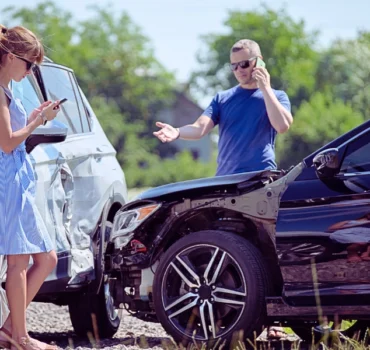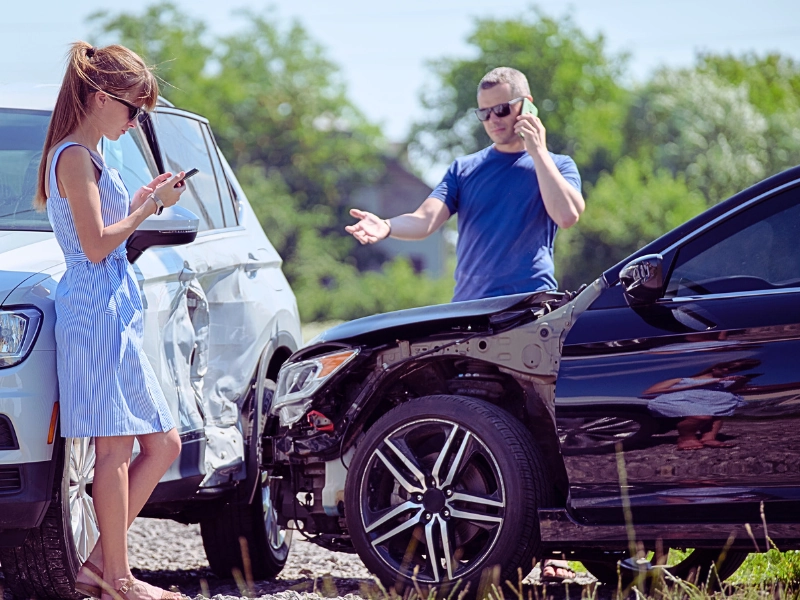Texas At-Fault Laws: What They Mean After a Crash in Houston

Texas at-fault laws guide how you can seek compensation for medical bills, lost wages, vehicle repairs, and other damages from crashes. Determining legal responsibility in Houston is your first step toward getting compensation for these injuries and damages.

Insurance companies do not always play fair, especially when liability is in dispute. A car accident lawyer can handle the legal details so you can focus on healing. Call Bradshaw Law at 775-738-7444 for a free consultation.
Table of Contents
How Do Texas Laws Determine Who Pays After a Car Accident?
In Texas, one person is injured in a crash every two minutes and five seconds. Since Texas is an at-fault state, drivers who cause crashes are financially responsible for the damages. This differs from no-fault states, in which drivers typically turn to their own insurance policies regardless of who caused the crash.
Texas at-fault laws determine liability using modified comparative negligence. You can recover damages if you are 50% or less at fault, and your compensation goes down by the percentage of fault assigned to you. If you are 51% or more at fault, you cannot recover anything.
Modified comparative negligence applies in all types of crashes, including rear-ends, multi-vehicle pileups, and commercial truck crashes. That said, sometimes a truck accident is different from a car accident. This could be due to the complexity of federal regulations and the multiple parties who may be liable. The trucking company and a third-party maintenance provider could share some fault, for instance.
What Evidence You Need to Prove Fault in a Houston Crash
Proving fault in a car crash requires strong evidence, especially since insurance companies conduct their own investigations. To make a strong case, gather the following evidence:
- Police reports: The official accident report often includes the responding officer’s assessment of fault, statements from drivers and witnesses, and diagrams of the crash scene.
- Photographs and video: Scene reconstruction helps with fault assessment and can be more accurate with dashcam footage as well as photos of the vehicles, road conditions, traffic signs, skid marks, and injuries.
- Medical records: Medical records document how bad your injuries are and link them to the crash. This documentation particularly helps if you are seeking damages for long-term or permanent injuries.
- Witness statements: Independent eyewitnesses may offer unbiased accounts that support your version of events. Get their contact information at the scene if possible.
- Expert testimony: Accident reconstruction experts are among those who can provide expert testimony. Reconstruction specialists can analyze speed, point of impact, and vehicle damage to show how the crash happened. Other experts can be technological, forensic, automotive, medical, and vocational. For instance, a cellphone expert may be able to determine if a driver was texting.
Why You Should Call a Car Accident Lawyer After a Collision
There are many reasons victims benefit from working with a car accident lawyer.
Insurance Companies
Insurers may try to deny your claim, delay payment, or offer a low settlement. A Houston car accident lawyer can push back, negotiate for you, and present the evidence to protect your rights under Texas at-fault laws.
Comparative Fault
If the other driver (or the driver’s insurer) claims you were partially responsible for the crash, this could reduce your compensation or lead to outright denial of your claim. Lawyers can challenge these allegations and present a strong case for minimal fault.
Lawsuit
Most car accident claims settle out of court. However, if the insurance company refuses to offer a fair amount, your lawyer can file a lawsuit and prepare for trial. If you lose a car accident lawsuit, you may not recover compensation for any of your damages. A lawyer improves your odds of a fair outcome.
Children or Fatalities
If accidents involve children or fatalities, you may need a lawyer to handle wrongful death or long-term injury claims. These cases often involve unique legal and emotional nuances, including future care costs, educational setbacks, and psychological trauma. Situations with children involved in a crash can be trickier, as the injuries and their long-term impact may be harder to demonstrate. A lawyer can help make sure that future medical needs get fair consideration when it comes to compensation packages.
Truck Accidents and Employer Liability
A truck accident may be different from a car accident due to driver logs, vehicle maintenance records, black box data, and multiple layers of responsibility. Look for a lawyer familiar with trucking regulations.
You deserve peace and fair compensation after a car crash. Contact us at Bradshaw Law to discuss your case.


